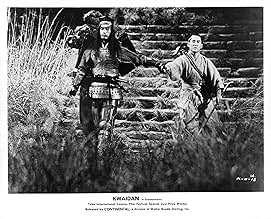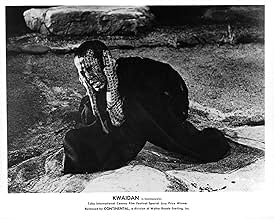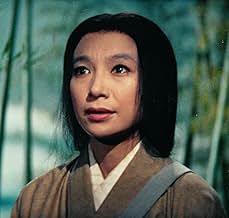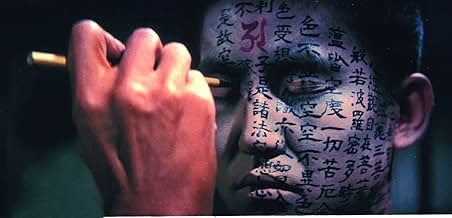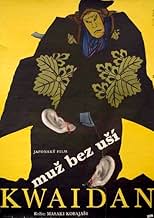A collection of four Japanese folk tales with supernatural themes.A collection of four Japanese folk tales with supernatural themes.A collection of four Japanese folk tales with supernatural themes.
- Nominated for 1 Oscar
- 5 wins & 2 nominations total
- Director
- Writers
- All cast & crew
- Production, box office & more at IMDbPro
Storyline
Did you know
- TriviaThe four vignettes were chosen to represent the four seasons of the year.
- GoofsIn the segment "Miminashi Hôichi no hanashi", Donkai says he covered all of Hôichi's body with the sacred writing, but when Hôichi is writhing on the floor after the ghost's attack, his thighs (which in the shots were supposed to be covered by his robe) are visible for a couple of seconds and are clearly unmarked.
- Quotes
Hoichi (segment "Miminashi Hôichi no hanashi"): As long as I live, I'll continue to play the biwa. I'll play with all my soul to mourn those thousands of spirits who burn with bitter hatred.
- Alternate versionsOriginally a four-episode anthology released in Japan at 183 minutes. The USA version removes the second episode, starring Keiko Kishi and Tatsuya Nakadai, in order to shorten the running time to 125 minutes.
- ConnectionsEdited into Catalogue of Ships (2008)
Featured review
Kwaidan is one of the great underappreciated films: no one's heard of it, but you'll never, ever forget it once you've seen it. Parts of it may seem slow to some viewers, and most of the stories are extremely predictable, but I have to say this is one of the most beautiful, haunting movies I've ever seen.
Of all the stories I prefer "Black Hair," the first one. Though a rather pointless horseback archery scene just slows it down, it's by far the scariest and most nightmare-worthy of the stories, using sound to incredibly chilling effect. There's more terror in the last minute of this segment than in all three Scream movies put together. Trust me, if you consider yourself a serious fan of horror cinema, you have to see this.
The second story, "The Woman of the Snow," is good, though I wish it ended more like "Black Hair" (you'll see what I mean). "Hoichi the Earless," with its jaw-dropping sea battle sequence, is by far the biggest and most popular of the stories. It's also the most influential, with its main premise prominently re-used in Conan the Barbarian. The film ends with "In a Cup of Tea." This is the only story that doesn't completely telegraph its ending, and coming after three utterly predictable stories, its complexity is a bit unexpected and disorienting. Certainly it's as creepy and beautiful as the rest of the film, but I have to admit I don't really understand it.
Being a tremendous fan of elegant, understated horror movies, as well as a student of Japanese culture, I consider this film one of my all-time favorites. Granted, some viewers may be turned off by the leisurely pace and the theatrical, intentionally unrealistic sets. But this is undeniably a beautiful and chilling film, absolutely perfect to watch late at night, alone, in the dark.
Of all the stories I prefer "Black Hair," the first one. Though a rather pointless horseback archery scene just slows it down, it's by far the scariest and most nightmare-worthy of the stories, using sound to incredibly chilling effect. There's more terror in the last minute of this segment than in all three Scream movies put together. Trust me, if you consider yourself a serious fan of horror cinema, you have to see this.
The second story, "The Woman of the Snow," is good, though I wish it ended more like "Black Hair" (you'll see what I mean). "Hoichi the Earless," with its jaw-dropping sea battle sequence, is by far the biggest and most popular of the stories. It's also the most influential, with its main premise prominently re-used in Conan the Barbarian. The film ends with "In a Cup of Tea." This is the only story that doesn't completely telegraph its ending, and coming after three utterly predictable stories, its complexity is a bit unexpected and disorienting. Certainly it's as creepy and beautiful as the rest of the film, but I have to admit I don't really understand it.
Being a tremendous fan of elegant, understated horror movies, as well as a student of Japanese culture, I consider this film one of my all-time favorites. Granted, some viewers may be turned off by the leisurely pace and the theatrical, intentionally unrealistic sets. But this is undeniably a beautiful and chilling film, absolutely perfect to watch late at night, alone, in the dark.
- Speechless
- Feb 13, 2001
- Permalink
- How long is Kwaidan?Powered by Alexa
Details
Box office
- Budget
- ¥350,000,000 (estimated)
- Runtime3 hours 3 minutes
- Aspect ratio
- 2.35 : 1
Contribute to this page
Suggest an edit or add missing content



